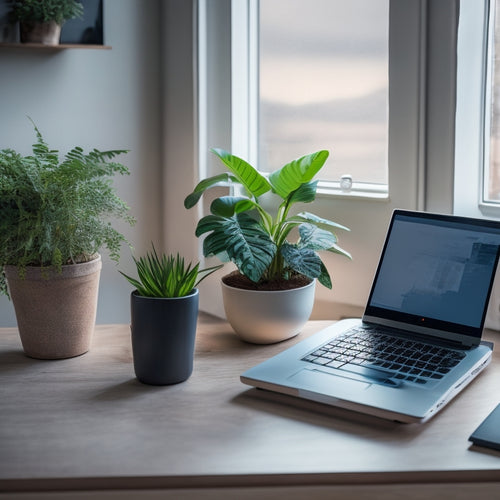
Declutter Flashcards: The Ultimate Organization Hack
Share
Maintaining a clutter-free study space is key to maximizing the full potential of flashcards as an effective learning tool. A decluttered space enhances focus, reduces stress, and promotes mental clarity. Organizing flashcards through categorization, labeling, and efficient storage saves time and reduces frustration. By implementing a minimalist workspace, using the Pomodoro Technique, and designating a specific study area, individuals can optimize learning and productivity. By streamlining study routines, setting realistic goals, and prioritizing tasks, individuals can maximize their study time and achieve academic success. Now, discover how to transform your study habits and take your learning to the next level.
Key Takeaways
• Categorize and store flashcards to streamline the learning process and reduce study time.
• Implement a flashcard storage system that works for you, grouping similar cards together and labeling each category.
• Store frequently reviewed cards in easily accessible locations to save time and reduce frustration.
• Use a minimalist study setup to promote mental clarity and reduce mental fatigue.
• Decluttering flashcards leads to stress reduction and improved mental well-being.
Simplify Your Study Space
Optimize your learning environment by decluttering your study space, which can greatly enhance focus, productivity, and overall academic performance. A minimalist study setup is essential in promoting mental clarity and reducing distractions.
Efficient storage solutions, such as shelves and baskets, can help keep essential materials within reach while keeping the area organized. Decluttering benefits extend beyond the physical space, as it can also lead to stress reduction and improved mental well-being.
Flashcard Organization Methods
Effective flashcard organization methods involve categorizing and storing cards in a way that facilitates easy access and review, thereby streamlining the learning process.
A well-organized system enables you to quickly locate specific cards, saving time and reducing frustration. Implement a flashcard storage system that works for you, such as using dividers or separate folders to categorize cards by topic or subject.
Organization tips include grouping similar cards together, labeling each category, and storing frequently reviewed cards in an easily accessible location.
Decluttering for Better Focus
A well-organized flashcard system is only as effective as the learning environment that surrounds it, and a cluttered space can hinder focus and productivity.
Mindful decluttering is essential to create a conducive study atmosphere. By adopting productivity tips such as designating a specific study area and removing distractions, you can optimize your learning experience.
A minimalist workspace can help you stay focused and avoid mental fatigue. Implementing study strategies like the Pomodoro Technique, which involves working in focused intervals with regular breaks, can also enhance your productivity.
Creating a Productive Routine
Regularly establishing a consistent daily routine helps to create an environment that fosters productivity and supports learning. By prioritizing tasks and allocating specific time slots, individuals can optimize their time management skills. This, in turn, enables them to tackle complex topics and retain information more effectively.
Effective productivity tips include setting realistic goals, breaking tasks into manageable chunks, and incorporating regular breaks to maintain focus. Additionally, allocating time for self-care and relaxation is essential to avoid burnout. By implementing these strategies, individuals can create a routine that promotes productivity, reduces stress, and enhances overall well-being.
Maximizing Your Study Time
By streamlining daily routines and prioritizing tasks, individuals can free up valuable time to focus on studying and learning, allowing them to maximize their study time and achieve academic success. Effective time management is essential in optimizing study efficiency. By setting realistic goals and deadlines, individuals can allocate sufficient time for each task, minimizing procrastination and distractions.
Prioritizing challenging topics and breaking them down into manageable chunks can also enhance study efficiency. Additionally, using active learning techniques, such as summarizing notes in their own words, can help individuals retain information better. By implementing these strategies, individuals can make the most of their study time, leading to improved academic performance and confidence.
Frequently Asked Questions
Can I Use Declutter Flashcards for Non-Academic Organization Tasks?
Just as a chef uses a recipe to orchestrate a harmonious dish, you can repurpose declutter flashcards to prioritize tasks, track habits, and streamline non-academic organization tasks, making them a versatile tool for achieving order and efficiency in various aspects of life.
How Do I Avoid Feeling Overwhelmed by the Decluttering Process?
To avoid feeling overwhelmed by the decluttering process, adopt a mindful approach by taking baby steps, focusing on one area at a time, and entering "mindfulness mode" to cultivate a sense of calm and clarity.
Are Digital Declutter Flashcards as Effective as Physical Ones?
In the digital world, declutter flashcards may seem like a convenient solution, but they can be hindered by digital limitations and screen distractions, making physical flashcards a more effective tool for focused decluttering.
Can I Customize Declutter Flashcards to Fit My Personal Learning Style?
To optimize learning, customize flashcards by incorporating visual elements that cater to your personal learning style. For instance, visual learners can benefit from color coding, images, and diagrams, while others may prefer concise bullet points or mind maps.
How Often Should I Review and Update My Declutter Flashcards?
To maintain peak effectiveness, establish a regular review schedule for your flashcards, aiming to revisit them every 1-3 weeks, adjusting the frequency based on your learning pace and goals, and updating content as needed to guarantee sustained progress.
Related Posts
-

What Makes the Best DIY Storage Ottoman?
When constructing your ideal DIY storage ottoman, consider essential features like color, size, upholstery, and compl...
-

Declutter Your Desk With These Online Tutorials
You're just one organized desk away from boosting your productivity, reducing stress, and achieving a sense of contro...

